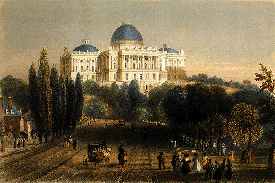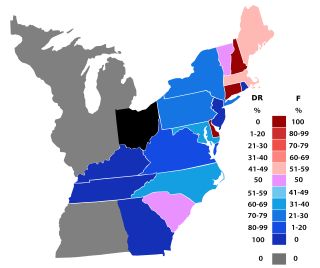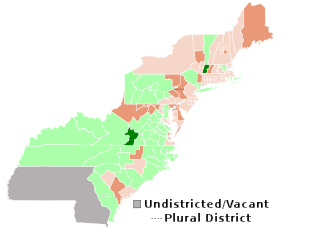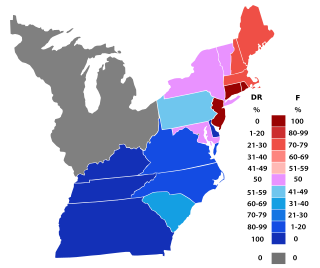| Elections in Maine |
|---|
 |
This was the first election in Maine since its separation from Massachusetts. In the previous election, Massachusetts had had 20 representatives. Seven seats (representing the 14th - 20th districts ) were reassigned from Massachusetts to Maine. In addition, under the terms of the law which admitted Maine to the union, any vacancies in the 16th Congress by Representatives elected to represent Massachusetts but residing in the new states of Maine would be filled by a resident of Maine. [1] John Holmes, who had been elected to the House for the former 14th district of Massachusetts was elected as one of the first two senators for Maine. The vacancy was filled in a special election by Joseph Dane (Federalist). Dane was the only Representative officially considered as representing Maine in the 16th Congress. The Representatives from the 15th-20th districts were still classified as being from Massachusetts for the remainder of the 16th Congress.
Maine elected its members November 7, 1820. Maine law required a majority to win election necessitating additional ballots if a majority was not received so additional ballots were held January 22, 1821 and September 10, 1821, after the term began but before the new Congress convened.
| District | Incumbent | This race | |||
|---|---|---|---|---|---|
| Member | Party | First elected | Results | Candidates | |
| Maine 1 | Joseph Dane | Federalist | 1820 (Special) | Incumbent re-elected. | √ Joseph Dane (Federalist) 52.8% Alexander Rice (Democratic-Republican) 38.7% Isaac Lyman 6.0% William Moody 2.4% |
| Maine 2 | Ezekiel Whitman Redistricted from Massachusetts's 15th district | Federalist | 1808 1810 (Lost) 1816 | Incumbent re-elected. | √ Ezekiel Whitman (Federalist) 74.1% James Irish 24.6% Mark Harris(Democratic-Republican) 1.3% |
| Maine 3 | Mark Langdon Hill Redistricted from Massachusetts's 16th district | Democratic-Republican | 1819 | Incumbent re-elected on the second ballot. | First ballot (November 7, 1820): Mark Langdon Hill (Democratic-Republican) 49.9% Joseph F. Wingate (Democratic-Republican) 39.8% Joshua Head 4.4% Daniel Rose (Democratic-Republican) 3.5% Pearl Stafford 2.4% Second ballot (January 22, 1821): √ Mark Langdon Hill (Democratic-Republican) 54.2% Joseph F. Wingate (Democratic-Republican) 44.7% Others 1.1% |
| Maine 4 | Martin Kinsley Redistricted from Massachusetts's 17th district | Democratic-Republican | 1819 | Incumbent lost re-election. New member elected on the third ballot after the beginning of the term but before Congress convened. Democratic-Republican hold. | First ballot (November 7, 1820): William Durkee Williamson (Democratic-Republican) 44.7% Jacob MacGaw (Federalist) 21.2% John Cooper 11.8% Martin Kinsley (Democratic-Republican) 11.2% John Wilkins (Democratic-Republican) 9.3% Josiah Kedder 1.3% Second ballot (January 22, 1821): William Durkee Williamson (Democratic-Republican) 45.8% Jacob MacGaw (Federalist) 22.8% John Wilkins (Democratic-Republican) 13.1% Martin Kinsley (Democratic-Republican) 9.6% John Cooper 7.1% Third ballot (September 10, 1821): √ William Durkee Williamson (Democratic-Republican) 50.2% Thomas Cobb 17.8% Jabez Mowry 17.4% Martin Kinsley (Democratic-Republican) 8.1% |
| Maine 5 | James Parker Redistricted from Massachusetts's 18th district | Democratic-Republican | 1813 1814 (Lost) 1819 | Incumbent lost re-election. New member elected on the third ballot after the beginning of the term but before Congress convened. Democratic-Republican hold. | First ballot (November 7, 1820): Ebenezer Herrick (Democratic-Republican) 38.2% Ebenezer T. Warren (Democratic-Republican) 31.3% James Parker (Democratic-Republican) 21.6% Joshua Gage (Democratic-Republican) 4.7% Peter Grant (Federalist) 1.5% Others 2.8% Second ballot (January 22, 1821): Ebenezer Herrick (Democratic-Republican) 38.1% Joshua Gage (Democratic-Republican) 27.6% Ebenezer T. Warren (Democratic-Republican) 24.7% Peter Grant (Federalist) 8.6% James Parker (Democratic-Republican) 1.0% Third ballot (September 10, 1821): √ Ebenezer Herrick (Democratic-Republican) 52.7% Ebenezer T. Warren (Democratic-Republican) 24.6% Peter Grant (Federalist) 10.5% Joshua Gage (Democratic-Republican) 7.1% James Parker (Democratic-Republican) 5.2% |
| Maine 6 | Joshua Cushman Redistricted from Massachusetts's 19th district | Democratic-Republican | 1818 | Incumbent re-elected. | √ Joshua Cushman (Democratic-Republican) 100% |
| Maine 7 | Enoch Lincoln Redistricted from Massachusetts's 20th district | Democratic-Republican | 1818 (Special) | Incumbent re-elected. | √ Enoch Lincoln (Democratic-Republican) 95.9% Samuel A. Bradley 1.5% Others 2.6% |











